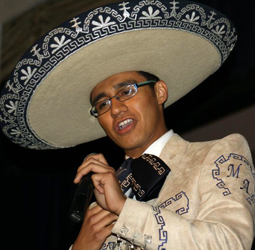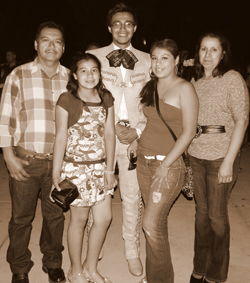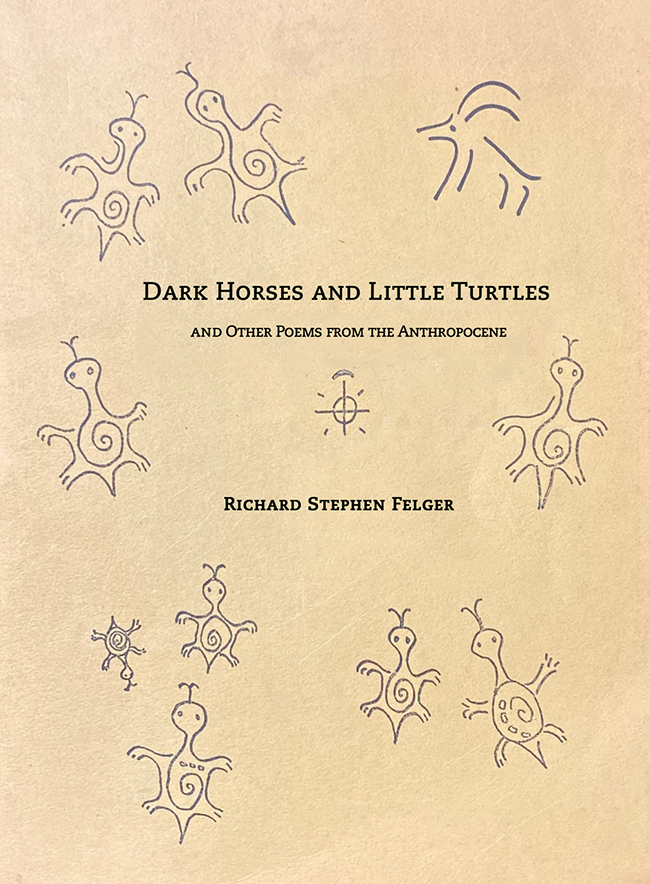Nine Digits
Stories about local, undocumented youth who are working toward becoming American citizens. First names are used to protect the indenities.

Edgar loves performing and playing music.
Edgar is like any new high school graduate, an 18-year-old looking forward to starting college in the fall with a good friend who will be his roomie. His favorite subject is math, he is passionate about music (“music got me everywhere”), loves gardening and contributing to his community through volunteer work.
Edgar is a driven young man, hard-working, intelligent and determined to be successful in life. He is a shining example of the mission of the GEAR UP Project, a U.S. Department of Education program that served low-income students who began 6th grade in 2005 and were slated for a 2012 graduation. The federally-funded, competitive national program, which provided over $9 million locally to Tucson Unified and Sunnyside School Districts over the six years, was administered here by the University of Arizona and Pima Community College. The funds were matched locally through cash and in-kind services.
GEAR UP is the acronym for Gaining Early Awareness and Readiness for Undergraduate Programs; it was designed, according to its website, “to increase the number of low-income students who are prepared to enter and succeed in postsecondary education.”
Edgar remembers the day when representatives came to his class to talk about the program.
“They told all of the students there was this project that they created, called the GEAR UP Project in which all of the 6th graders back then through TUSD schools were so called GEAR UP students and that they were going to get the privilege of having all these projects, one of them was the ‘Math Through Mariachi’ program. I thought, ‘Music, I’ve been wanting to do music for a good while,’ so I chose the mariachi program for the summer. Since then, they’ve been following us through high school until graduation, so that project helped us develop our knowledge for college and helped throughout high school in the ways of what to do in order to get to college and have a good career and education.”
It clicked for Edgar. He found himself excelling in math, while stoking his love of music. He explains that the instructors taught the students “how math works with music notes and music theory. Basically, counting the notes, notes equal this, the time measuring.”
The funds for the program were also slated to provide college scholarships for the participants. Edgar, however, does not qualify for those funds as he is an undocumented resident. Like hundreds of thousands of other young people, Edgar was brought to the United States, illegally, as a child.
“I was about 7-years-old; I believe it was in 2001. We moved here from Nogales, Sonora. My dad moved over here before us with one of his family members, he’s been here since 1999, working here. He asked my mom to bring us over here, he said, ‘Bring them over here so they can have a good education, and learn English.’ And, my mom agreed. And we didn’t know anything. My mom just told us, ‘We’re going on vacation.’ It was after I got out of 2nd grade and we headed over here to Tucson. We brought a bunch of clothing, and I asked my mom, ‘Why all of this clothing if we are only going to stay a couple of weeks?’ And then she told us, ‘We’re going to go live with your dad.’ Me and my two sisters, we were super excited. At the moment I was 7, my older sister was 11 or 12 and my little sister wasn’t even a year old, just months old. We came here and fell in love with Tucson.”
As anyone who has been the “new kid” knows, it isn’t easy. Try putting a language barrier on top of that. Edgar remembers wanting to learn English, attempting to make friends, and meeting resistance.
“I thought it was going to be so fun, but seeing new faces staring at me and just talking in English, just gave me a non-motivation of staying there and learning English. They weren’t encouraging me to stay there; they just stared at me like, ‘who’s this mysterious kid from out of nowhere?’ My teacher would sometimes speak to me in Spanish, but I think she came to dislike me. She would tell one of the students in English for that student to translate it to me in Spanish, even though she knew Spanish.”
Amid the adversity, Edgar gathered the power within himself to keep moving forward academically.

Edgar, center, flanked by his familia.
“I would say it took me about three months to be able to get the English going on and have a conversation with someone. Pretty much what motivated me was my 3rd grade teacher, although she disliked me, she gave me the strength to just keep learning, to see if I could manage to speak that new language. I wanted to prove to her, no matter what, ‘I will learn English, I will achieve my goal of success,’ even though that she believed I wouldn’t be able to manage the English language.”
Manage the language he did, and he speaks with purpose and clarity. Edgar is most animated when talking about music and math and his upcoming college career. He says that music has gotten him everywhere, he’s performed with several mariachi bands and humbly reveals the instruments he’s played: violin, clarinet, guitar, vihuela and guitarrόn. As a result of the GEAR UP “Math through Mariachi” experience, Edgar enjoys working with numbers and is looking forward to studying business management at a private university in Phoenix.
“In the future, I want to have my own business, probably helping out my older sister since she wants to have her own restaurant, she’s doing culinary arts right now, she wants to be a chef, so probably I will do a family business and manage the business area, and her the cooking area.”
When asked about the “American Dream” and if he feels like he is living it because of the education he has received, he is understandably hesitant when answering.
“I don’t know. I never understood the definition of the American dream. All I know is, what some people have told me about the American dream is, having your own home with the white picket fence, and everything, but man – those days are gone for us.”
Edgar’s temporal place in current and recent American policies has afforded him interesting experiences as an undocumented resident. Of course, there is the late June announcement from the Obama administration that individuals between 16- and 30-years-old who came to the United States before they were 16, lived in the U.S. continuously for five years, are high school graduates or GED certified without criminal records, will not be deported to their countries of birth – places many undocumented youth in the United States are unfamiliar with.
The Obama announcement preceded an expected Supreme Court ruled on Arizona v. United States – in response to Arizona’s controversial 2010 Senate Bill 1070. The bill outlined requirements for state and local police officers to attempt to determine the immigration status of any person stopped under state or local law if “reasonable suspicion” exists, makes it a crime for immigrants who are not authorized to work in the United States to apply for work, solicit work in a public place, or perform work within the state’s borders, among other provisions.
Edgar’s right to attend local schools as an undocumented resident goes back to a 1982 Supreme Court 5-4 ruling in the Plyler v. Doe case, which struck down a Texas law that denied children enrollment in schools who had not been legally admitted to the United States. The court ruled that the Texas law was in violation of the 14th Amendment’s Equal Protection Clause, in summary: undocumented children have the same right to a free public education as U.S. citizens and permanent residents. Undocumented immigrant students are obligated, as are all other students, to attend school until they reach the age mandated by state law.
Although he has been afforded an education because of a case ruling eleven years before his birth, Edgar has definitely faced road blocks due to not having a social security number. In 2010, Edgar was nominated by his high school teachers and confirmed by the American-Israel Friendship League as a student representative for an exchange program with Israel. When the league informed Edgar about the necessary documents for the program, he confided to one of the representatives that he didn’t have legal residency in the U.S. He explained that he didn’t have the pertinent documentation to prove who he was, telling the representative, “I am just an anonymous person here, because I don’t have my visa or anything else to show who I am.”
Edgar reflects on the fact this was during the height and hype of S.B. 1070. “I believe it was at the time that S.B. 1070 was going on, and she told me, ‘Well, since you say you are undocumented, I’m supposed to report you to immigration, so that they can send you away, but I will not do this, because I have a big heart. I’m going to give you some information from some immigration lawyers, to see what they can do. So far, right now, you will not be able to go with us to Israel.’
“I was so depressed; I was upset for all of that – doing so much work (submitting the applicable documents for the exchange program), to not get to go. That was one of the moments that was devastating for me for not having those nine digits.
“I was scared, because if I ever applied for anything like that again, they were going to ask me for that (information), I was afraid to apply for anything, actually, because if I told them that I didn’t have anything, I was afraid that they were going to report me to immigration. I didn’t want that to happen.”
Edgar continues to forge ahead with the help of family and teachers, who told him, “Mijo, don’t be scared. Everything’s going to be alright as long as you know how to find the information, you will obtain it. There’s a lot of opportunities out there, whether you are undocumented or from here or anything, there’s big opportunities out in the world.”
Edgar looks to have a bright future, and with President Obama’s policy directive, he will be able to work – something he very much wants to do.
“I will be ready for it, it’s a good chance to start a good life and get a good job.”
Category: Community




